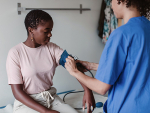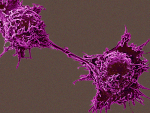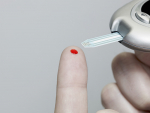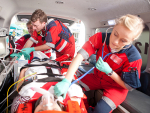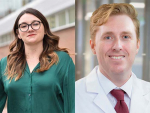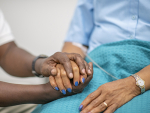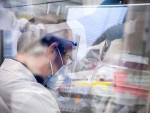Displaying items by tag: school of medicine
Thomas Buford to head the UAB Center for Exercise Medicine as the new director starting Aug. 1, 2020.
Tagged under
Cooper Pierce was 13 years old when doctors diagnosed him with pulmonary hypertension. He had a heart and double-lung transplant at UAB Hospital. Now, he is a student at UAB and hopes his story can inspire others.
Tagged under
GuideSafe is the uniting platform/brand for ongoing communication about COVID-19 testing, tools and actions to promote a safe entry to higher education campuses and ongoing COVID-19 monitoring for students and the community at large.
Tagged under
Women who had total body irradiation to prepare for blood or marrow transplantation before age 30 had a 4.5-fold increase in their risk of developing breast cancer later in life.
Tagged under
UAB scientist Jessy Deshane is one of five researchers to receive a specialized grant from NanoString Technologies, which will allow her to evaluate immune response in 3D non-small-cell lung cancer models.
Tagged under
A study conducted by UAB investigators shows that nearly a third of non-Hispanic Black young adults nationwide have hypertension, and the control of high blood pressure in all young adults is only 10 percent.
Tagged under
A study identifying biomarkers for certain neuroendocrine cancers demonstrates a novel approach for identifying and detecting tumor drivers, giving this diagnostic-therapeutic coupled system a broad translational potential.
Tagged under
The drug candidate is a non-toxic small molecule that given orally effectively rescued mice from models of Type 1 and Type 2 diabetes.
Tagged under
The CARES Act funding from the Jefferson County Commission will support up to 50,000 community COVID-19 tests
A grant to the UAB stroke center will help maximize a state health department effort to better manage strokes in Alabama.
Tagged under
This research offers fundamental insights about sensory thalamic subnetworks and will enable powerful new strategies to probe behavioral and perceptual functions of these distinct circuits.
Tagged under
A $75,000 gift from the Mike & Gillian Goodrich Foundation to support cancer awareness and COVID-19 response in Alabama’s Back Belt region was given to the O’Neal Comprehensive Cancer Center at UAB.
Tagged under
Graduate student Rylie Hightower is the fifth UAB student to receive an F99/K00 grant from the National Institutes of Health.
Tagged under
UAB has set a new institutional record with seven students selected for the Benjamin A. Gilman International Scholarship.
Tagged under
Research suggests categorizing sinus conditions by inflammatory subtypes of chronic rhinosinusitis can lead to improved delivery and effectiveness of treatment.
Tagged under
Three UAB doctors and professors share five ways the medical community can work to address the needs of underrepresented populations as we work to understand COVID-19.
Tagged under
Up to 70 percent of adults with sickle cell anemia will develop chronic kidney disease; Lebensburger’s research will address monitoring renal disease progression.
Tagged under
AdCOVID stimulated both strong serum neutralizing activity and potent mucosal IgA immunity in the respiratory tract.
Tagged under





